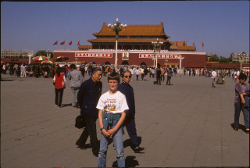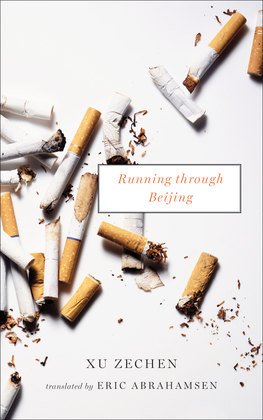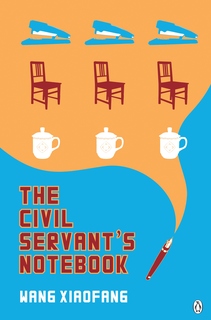Posts
By Eric Abrahamsen, August 3, '10
Here comes a rather impressive dispatch from the far reaches of linguistic brain-bendery: Johnathan Stalling's Yingelish, a poem written in Chinese characters, which can be read aloud (in Chinese) to create a completely different story in Chinese-sounding English. As if that weren't impressive enough, the whole thing was rendered last week as a "Sinophonic English Opera" at the University of Yunnan, where the text was sung, acted out, and accompanied by a dizzying array of musical instruments. Download the flyer for the event, or see a few pictures here (Chinese only).
By Eric Abrahamsen, July 17, '10
Cha: An Asian Literary Journal (http://asiancha.com/) iis now accepting submissions for "The China Issue", an edition of the journal devoted exclusively to work from and about contemporary China. The issue, which will be published in June 2011, will feature poetry, fiction, creative non-fiction, scholarly works and visual art exploring the modern Middle Kingdom. We are looking for submissions from a wide range of Chinese and international voices on the social, political and cultural forces which are shaping the country. If you have something interesting, opinionated or fresh to say about China today, we would like to hear from you. Please note that we can only accept submissions in English. More information here: http://asiancha.blogspot.com/2010/07/call-for-submissions-china-issue.html
By Eric Abrahamsen, July 16, '10
The University of Iowa's "Life of Discovery" program concluded recently: this was the second annual installation of a joint program between Iowa's International Writing Program and the China Writers Association, bringing American and Chinese writers together for a little road-trip bonding. Besides the official webpage above, you can peruse their blog, where the writers (Americans only?) posted photos and blogged their bewilderment. The event consisted of two parts: a week in Iowa last May, and a couple of weeks in China, mostly Kunming, which ended July 9.
This year's participants, on the Chinese side:
- Liu Zhenyun 刘震云
- Peng Xueming 彭学明
- Fan Jizu 范继祖
- He Xiaomei 和晓梅
- Lu Qin 禄琴
- Yang Guoqing 杨国庆
- Zhang Gencui 张根粹
Interestingly, nearly all the Chinese participants were ethnic minorities, mostly poets. The Americans:
- Christopher Merrill
- Vu Tran
- Matt Hart
- Kiki Petrosino
- Amanda Nadelberg
- Kyle Dargan
Great to see these kinds of events going on!
By Eric Abrahamsen, June 24, '10
Next Tuesday (June 29) Chun Shu will be giving a talk at the Trends Lounge in Beijing about her new book, Light Year American Dream, as part of the Trends Lounge's Cosmo Women's Reading Salon series.
Time: June 29 (Tuesday), 7-9pm
Venue: Trends Lounge, 2F The Place (世贸天地), Beijing
Phone: 010 6587 1999
By Eric Abrahamsen, June 3, '10
The winners of PEN's annual translation prize have been announced. Among many worthy winners in many worthy languages, our own particular bias has been satisfied in the form of David Hull's translation of Waverings (presumably 动摇), a novel by Mao Dun. See their official announcement. Congrats to David Hull, a grad student at UCLA.
Nice to see attention paid to the old worthies!
By Eric Abrahamsen, June 1, '10
A little Monday-morning horn-tootling: Our very own Nicky Harman has been chosen to translate Jin Shan, aka Gold Mountain Blues, by Zhang Ling.
Nicky's situation is a little unusual in that her translation is being commissioned and published by multiple publishing houses in various regions simultaneously, rather than the usual practice of a single commissioning publisher who then sells the rights on. Hopefully this will result in slightly better terms for Nicky.
Gold Mountain Blues will come out with Atlantic in the UK/Commonwealth and Penguin in Canada, and is scheduled to appear in late 2011/early 2012. It has also sold into eight other languages/territories.
Congratulations, Nicky, and we look forward to reading it!
By Eric Abrahamsen, June 1, '10
What looks like a great event at the One Way Bookstore this Saturday, 3-5pm. Jiang Yitan discussing his new book Lu Xun's Beard (鲁迅的胡子), in an event themed "Reading Quiet Fiction in an Unquiet Age". Also speaking are Li Er, one of our favorites, Ge Fei, often considered Li Er's mentor, Bei Cun, and Qiu Huadong, a writer of urban fiction to watch.
The One Way Street Bookstore's website appears to be down, here are the details:
Date/Time: June 5 (Saturday), 3-5pm
Address: Beijing, Solana (蓝色港湾), building 11, number 16
Phone: 010-59056973
By Eric Abrahamsen, May 24, '10
For the past couple months I've spent my Thursdays teaching literary translation classes to translation-studies majors at the Beijing Foreign Languages University. When they first came calling about this program, I suspected that it was of a piece with the government's plan to train an army of domestic Chinese-English translators, thereby liberating Chinese literature from the hands of fickle foreign translators with their imperfect comprehension and questionable loyalties (the final step of this plan is to train an even larger army of domestic readers to consume these domestically-produced English translations, whereupon the whole of Chinese culture will fold up and disappear with a "Foop!", leaving a blank space that can be filled with 喜羊羊 re-runs), and I was leery. They assured me that it was simply a cunning plan to use literary translation to improve the students' English, banking on the old chestnut that there is no more careful reader of a text than its translator, and I agreed.
More…
By Eric Abrahamsen, May 2, '10
For those of you reading via RSS: we've recently added a new Publishing Industry News section to Paper Republic, providing regular updates on… the publishing industry in China! There's a dedicated RSS feed for the news, and you can also write to us at news@paper-republic.org with any news, queries or requests of your own.
Along with the general tweaking we've also added one central page where you can see all the translation samples available for download on PR — read and enjoy!
By Eric Abrahamsen, April 11, '10
The latest (very small) controversy in the Chinese literary world is author Mai Jia's comments to the effect that "99.9% of online literature in China is garbage", and that if he were given the power he would do away with the internet altogether.
This sparked a lot of huffing and puffing, even attracting notice abroad, and now Mai Jia has posted a clarification on his seldom-updated blog.
The clarification is long-winded and hardly clarifying, but the excerpt he posts from his actual speech makes it pretty clear that he wasn't saying anything all that radical. The line about "exterminating" (消灭) the internet if he had the power (he's been quoted as saying he wants to get rid of all internet writing, but from the speech it seems clear that he means the whole internet) was obviously a throwaway joke (an earlier part of the blog post discusses what a pain the internet has been to him with regards to his thirteen-year-old son).
The second part, about 99.9% of internet literature being garbage and only 0.1% worth reading, is pretty much exactly what he said. But he then goes on to say that the most important and exciting thing about internet literature is that it is a free-for-all, with no artificial barriers to entry or readership, and that the literary greats of China's future are bound to arise online.
So his inflammatory comments, in summary: "There's a lot of crap on the web, but it's still the future."
No argument here.
By Eric Abrahamsen, April 5, '10
On the New Yorker blog Evan Osnos wrote a few days ago about how the Chilling Effects Clearinghouse, a website dedicated to tracking censorship and its deleterious effects, had been represented in the Chinese media as a pro censorship body, effectively reversing the truth in order to give Chinese viewers the impression that Chinese-style censorship is common all over the world. Osnos' question was: "I wonder what this says about the decision-making apparatus. Do some of China’s top technology-policy planners really misunderstand the state of play in the West?"
He invited responses, so this is mine: I think there's no question that this was done deliberately, as a part of a larger campaign to lightly confuse the Chinese people as to just how unnatural their government appears to most non-Chinese observers. Both the government and its people are deeply concerned that China should appear to be a "normal" country (never mind that it be a normal country) and much manipulation of public opinion goes into supporting this illusion. The only thing a little surprising about this case is how baldly the facts were reversed.
More…
By Eric Abrahamsen, March 29, '10
The third annual Beijing International Literary Festival ended about ten days ago; among a pretty outstanding roster of international authors were eight Chinese writers, photographs of whose events the Beijing Bookworm has kindly provided. Podcasts were made from some of the events as well, we've linked where appropriate.
More…
By Eric Abrahamsen, February 24, '10
The Chinese writer Mo Yan has kindly agreed to answer questions by Oriental Hemisphere (Vostochnoye Polushariye), Russia's biggest website on the day-to-day life, history and culture of the Far East and South East Asia, in connection with forthcoming publication of Mo Yan's 酒国 (The Republic of Wine) translated into Russian by Igor Yegorov (aka yeguofu). English translation courtesy of Igor Yegorov.
Question: Has your recent visit to Russia left you with new impressions? Has your notion of the country changed, compared to that of the past?
Answer: I visited Russia for the first time in summer of 1996. It was a two-day tour in a small town next to the Chinese frontier city of Manzhouli. My impressions of that day fitted badly with the notion of Russia that I had formed while reading books by Russian authors. It was not until 2007 when I went to Moscow to take part in the Year of China Book Exhibition that I fully appreciated the space and grandeur of the country. The vast Russian expanses which seem to have no boundaries, conceal the boldness and a big way of the country combined with its delicacy and soft beauty.
Q: What do you feel about Russian literature and who is your favorite Russian author?
A: Russian literature was first of all foreign literatures that I got acquainted with. When still a child I read The Tale of the Fisherman and the Fish by Pushkin in my elder brother's school textbook, then I went through The Childhood (My Universities) by Gorky. Of course, like any Chinese youth of those times, I read How the Steel Was Tempered by Nikolai Ostrovsky. My favorite Russian author, Mikhail Sholokhov, and his novel Quiet Flows the Don have added a lot to my formation as a writer.
More…
By Eric Abrahamsen, February 19, '10
The winner of the 2009 Dangdai Literary Prize was announced a couple of weeks ago (sorry, we've been eating dumplings in the northeast).
The shortlist included:
A Word is Worth a Thousand Words took the prize; Liu Zhenyun was also the winner of the 2007 prize with My Name is Liu Yuejin.
Previously…
By Eric Abrahamsen, February 18, '10
The first of its kind, the new Creative Writing MFA program at City University in Hong Kong is aimed at Asian writing in the English language. From the program description:
Its mission is to provide the best education possible for aspiring creative writers and teachers of creative writing, with a special focus on Asian writing in English as well as literature in English concerned with Asian themes.
The program is "low residency", and classes are taught by an international faculty of writers and teachers. Prospective students (who should already have a certain level of achievement in their chosen genre) should apply by the deadline of April 15.




